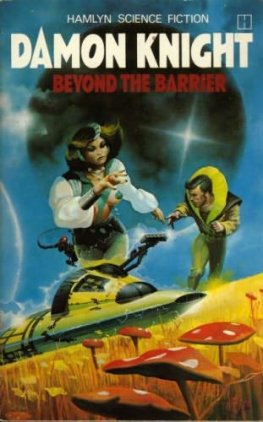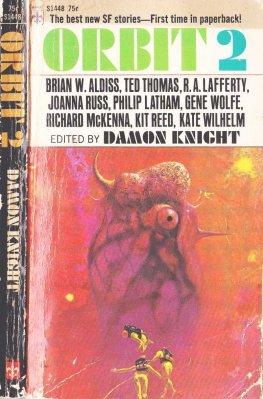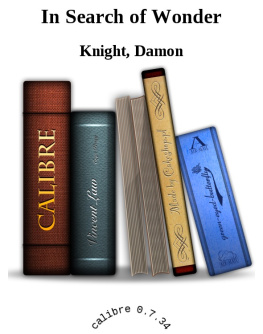Damon Knight - Orbit 21
Here you can read online Damon Knight - Orbit 21 full text of the book (entire story) in english for free. Download pdf and epub, get meaning, cover and reviews about this ebook. year: 1980, publisher: Harper & Row, genre: Science fiction. Description of the work, (preface) as well as reviews are available. Best literature library LitArk.com created for fans of good reading and offers a wide selection of genres:
Romance novel
Science fiction
Adventure
Detective
Science
History
Home and family
Prose
Art
Politics
Computer
Non-fiction
Religion
Business
Children
Humor
Choose a favorite category and find really read worthwhile books. Enjoy immersion in the world of imagination, feel the emotions of the characters or learn something new for yourself, make an fascinating discovery.

- Book:Orbit 21
- Author:
- Publisher:Harper & Row
- Genre:
- Year:1980
- ISBN:0-06-012426-1
- Rating:3 / 5
- Favourites:Add to favourites
- Your mark:
- 60
- 1
- 2
- 3
- 4
- 5
Orbit 21: summary, description and annotation
We offer to read an annotation, description, summary or preface (depends on what the author of the book "Orbit 21" wrote himself). If you haven't found the necessary information about the book — write in the comments, we will try to find it.
Orbit 21 — read online for free the complete book (whole text) full work
Below is the text of the book, divided by pages. System saving the place of the last page read, allows you to conveniently read the book "Orbit 21" online for free, without having to search again every time where you left off. Put a bookmark, and you can go to the page where you finished reading at any time.
Font size:
Interval:
Bookmark:
Orbit 21
Damon Knight
Proofed By MadMaxAU
INTRODUCTION:
ABOUT FIFTEEN YEARS OF ORBIT
In the sixties, when glossy special-interest magazines such as Popular Psychology were beginning to appear on the newsstands, it occurred to me that I, for one, would be willing to pay as much as a dollar for a good science fiction magazine in that format. I was on the road to inventing Omni, but I gave it up and began to think instead about the Science Fiction Book Club, which had a ready-made subscription list for books at a dollar each. They could not publish the collections I had in mindtheir advances were too small to pay for the materialbut they could reprint them. A series of original anthologies, like Fred Pohls Star Science Fiction, if it had hardcover, paperback, and book-club editions, could easily pay its way. I made up a proposal, called it Orbit more or less at random, and my agent sent it around.
Thomas A. Dardis, then editor-in-chief of Berkley, bought it, and we worked out the details. For a while Doubleday was interested in doing a hardcover edition, but that fell through; then Berkley was acquired by Putnam, and there was our hardcover edition. It was a funny arrangement in some ways, because Putnam had no science fiction editor and nobody knew quite what to do with Orbit. They handed the first volume over to an editor in the juvenile department and put a Young Adult label on it. It was an ugly book, too tall for its width, with a jacket the color of dog-do.
While this was in the works, I found out that the juvenile editor had changed two words in the text which he thought might offend librarians: they were breasts and heterosexuality. The second change made hash of the ending of Jim Blishs story, How Beautiful with Banners. I made an amazing stink, and the text was restored. Subsequent volumes were published as adult books.
* * * *What I wanted to do in Orbit was to bring about a revolution in science fiction, like Campbells in the early forties, Golds and Boucher/McComass in the fifties. My thesis was that there was no inherent reason why science fiction could not meet ordinary literary standards, but that the pulp tradition of forty years had encouraged ideas at the expense of writing skill. It seemed to me that the only way to cure this was to set high standards at the beginning, even if it meant publishing a lot of fantasy and marginal material because most hard-core s.f. could not make the grade. Later, cocky with success, I followed this trail too far.
* * * *In its first few years Orbit got submissions from many of the best-known writers in the field, and I rejected nearly all of them. I would have loved to have those authors in the book, but they were sending me the same kind of mechanical-repetitive science fiction that was appearing in the magazines.
I was a little shocked once, in the early fifties, when Tony Boucher mentioned casually that in a recent issue of F&SF there was only one story that he had bought solely because of the authors name. I thought that was one too many. Famous names may help sell a magazine; they dont always, but if they do, its because those writers have written good stories in the past. Every time you publish a poor story by a famous writer, you diminish the value of that name and defeat your own purpose.
* * * *One thing that was wrong with the field in the sixties was that there were only three editors buying short fictionCampbell, Pohl, and Robert P. Mills, then the editor of The Magazine of Fantasy & Science Fiction. Their combined tastes covered a large part of the spectrum, but not enough; there were good stories that none of them would buy. I bought some, and two of them won NebulasMother to the World, by Richard Wilson, and The Secret Place, by Richard McKenna.
Today there are so many editors that it is hard to believe that any story of the slightest merit is going unpublished. I have mixed feelings about this. Its great for writers, and more new ones are coming into the field now than at any time since the fifties. At the same time, the level of quality of the anthology series has fallen (while that of the magazines has risen a little) until there is not much to choose between anthologies and magazines.
* * * *Four or five times I have written rejection letters about stories from unknown writers, then torn the letters up and written contracts instead. These invariably turned out to be the first stories of writers who would become Orbit regulars. One of them was Gardner R. Dozois.
Gardner had been discharged from the Army in Germany, and was sharing an apartment with other ex-GIs in Nuremburg on next to no money. When he came back to the U.S. in 1969 or thereabouts, he had about thirty dollars. Late one evening he called me from a tavern in Milford where the bus had let him off, and I went down to fetch him. I had pictured him as a small Boy Scout soldier, pink-cheeked and fragile. What I saw was a giant in a scruffy black coat, with Alice-in-Wonderland hair down his back and the beard of a yak down his front. He saw my start of horror, and said later, with a chuckle, I freaked Damon out. He stayed at our house for two or three weeks, until we had to kick him out of the nest, and later he came back many times. After the first shock, we discovered he was gentle and shy, endearingly awkward, but with an instinct for survival; somehow he never poked his eye out with the spoon in his perpetual coffee cup. He went on long walks up the hill with my small son Jonathan, carrying him on his shoulders part of the time. There was a rusty abandoned tractor up there; they called it the Golden Tractor and played on it a lot.
* * * *One year I had sent Milford invitations to a lot of unfamiliar names I found in the magazines: one of them was Dobbin Thorp, and he accepted. I met him on the highway between my place and the White House Inn, where he was stayinga tall, pale, kind of skinheaded young man with a distracted look in his eye. I said, Dobbin? and with a grin he admitted that Dobbin Thorp was a pseudonymhe thought it would be funny to name himself after a horseand that he was Tom Disch; and I felt like a fool.
Jim Sallis and Gene Wolfe, who had been corresponding, came to the Milford Conference together a year or two after that. Neither one was what I had expected. Sallis was slender, dark-haired and intense, with an almost inaudible voice; Wolfe looked like a large Sergeant Bilko. Later I met Jims wife Jane, who looked like a large cuddly doll, and their son Dylan. They stayed in our house, with Tom Disch, when we went to Florida in 1968; Tom wrote a story about that and sold it to TriQuarterly or the Paris Review, I forget which.
I didnt meet R. A. Lafferty until the 1974 World Science Fiction Convention in Washington: he was a white-haired man with an enormous waistline, something like a giant leprechaun. He was always wandering through the lobby, and so were we, and when we met, three or four times a day, he would waggle his hands despairingly and croak, Same pee-pul.
* * * *Some things I am proud of: four Nebula Awards; first or early stories by Gene Wolfe, James Sallis, Carol Carr, Gardner Dozois, George Alec Effinger, Vonda N. Mclntyre, Gary K. Wolf, Dave Skal, Steve Chapman, Kathleen M. Sidney, Doris Piserchia, Joan D. Vinge, Kim Stanley Robinson . . .
I could claim to have discovered some of these writers, but I dont think thats how it appears to them. When you write a story the best way you know how, and send it to editors, and one finally buys it, you dont feel discovered, you feel lucky.
But it isnt luck. Any half-decent editor has his senses fine-tuned all the time in the hope of detecting a good new writer on the way up. If you show any sign at all that you know what youre doing, an editor will write you letters, encourage you, and maybe buy a story that is just barely good enough because he has a hunch the next one will be better.
Font size:
Interval:
Bookmark:
Similar books «Orbit 21»
Look at similar books to Orbit 21. We have selected literature similar in name and meaning in the hope of providing readers with more options to find new, interesting, not yet read works.
Discussion, reviews of the book Orbit 21 and just readers' own opinions. Leave your comments, write what you think about the work, its meaning or the main characters. Specify what exactly you liked and what you didn't like, and why you think so.



